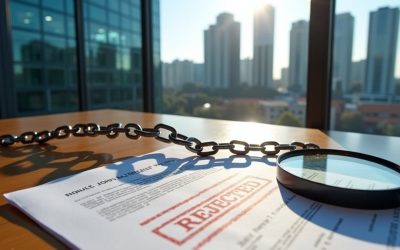You’re looking at £64 billion in UK property hidden through trust structures that exploit legal loopholes dating back to medieval times. These arrangements involve approximately 236,500 properties across England and Wales, with over 70% of overseas-owned real estate remaining completely anonymous. Trust mechanisms use settlor-beneficiary-trustee arrangements that mask true ownership, particularly in exclusive areas like Kensington and Chelsea where 40% of foreign properties utilize these structures. Current regulatory frameworks contain notable gaps that enable this widespread concealment, undermining sanctions enforcement and creating barriers for law enforcement seeking beneficial owners. The 2022 Economic Crime Act addressed some issues, but legislative inadequacies persist in allowing kleptocrats and sanctioned individuals to exploit these centuries-old legal mechanisms. Understanding these complex arrangements reveals how modern property markets operate beneath layers of deliberate opacity.

While transparency advocates push for greater accountability in property ownership, £64 billion worth of UK real estate remains hidden behind opaque trust structures. These arrangements allow individuals to shield their assets from public scrutiny, creating considerable challenges for regulators and law enforcement agencies.
Approximately 236,500 properties across England and Wales are obscured through these trust mechanisms. The structures effectively mask true ownership, making it nearly impossible to identify who actually controls these valuable assets.
Trust structures systematically conceal property ownership across England and Wales, rendering beneficial ownership identification virtually impossible for regulatory authorities.
Over 49,000 properties held by UK companies are controlled by trusts, with a combined value of at least £9 billion. In exclusive areas like Kensington and Chelsea, around 40% of overseas-owned property operates through trust arrangements, demonstrating the prevalence of these opacity tools.
You’ll find that more than 70% of UK properties held by overseas shell companies remain completely anonymous. This widespread concealment undermines efforts to enforce sanctions against designated individuals and complicates investigations into potential money laundering activities.
Current regulatory frameworks contain considerable loopholes that individuals exploit to hide illicit wealth. Despite the UK government’s introduction of a property register for offshore assets in 2022, many property owners continue using trusts to conceal their identities effectively.
Law enforcement agencies frequently struggle to identify beneficial owners due to these opaque structures. Over two-thirds of properties held by overseas shell companies maintain anonymity, with trusts serving as a primary concealment method.
The government is consulting on expanding third-party access to trust registration systems to improve transparency. However, guaranteeing full disclosure remains challenging because existing legislative gaps enable continued opacity rather than outright rule-breaking. The Economic Crime Act was established in 2022 to address these transparency issues following Russia’s invasion of Ukraine. Trusts originated from medieval practices for property management, involving a settlor, beneficiary, and trustee arrangement.
These trust arrangements particularly benefit kleptocrats and sanctioned individuals seeking to evade accountability measures. The structures create barriers that prevent effective enforcement of property regulations and anti-corruption initiatives.
Missing beneficial ownership information stems primarily from legislative inadequacies rather than deliberate violations of current rules. This situation highlights the urgent need for thorough legislation that mandates full transparency in property ownership structures.
The widespread use of opaque trusts fundamentally undermines the UK’s efforts to combat hidden wealth and promote accountability in its property markets.
Frequently Asked Questions
How Can Ordinary Citizens Identify if Their Neighbors Own Property Through Trusts?
You can check Land Registry records for title restrictions indicating trust ownership on neighboring properties.
Search Companies House for overseas entities owning nearby land, then review their beneficial ownership disclosures under Register of Overseas Entities rules.
Look for trustee names or trust-related notices on property titles.
However, trust structures often use nominees to conceal actual beneficiaries, making identification challenging without expanded regulatory access.
What Penalties Do Trust Beneficiaries Face for Non-Disclosure of Property Assets?
You’ll face inheritance tax penalties ranging from 50% to 100% of undeclared tax if you don’t disclose trust property assets.
HMRC can impose additional penalties under Schedule 24 of Finance Act 2007 for failing to report lifetime gifts.
If you’re involved with offshore trusts, penalties can reach 300% of tax due, plus 10% asset-based penalties.
You’ll also face potential tax liabilities on undisclosed assets and possible public disclosure by HMRC.
Which Government Agencies Are Responsible for Investigating Hidden Trust Property Schemes?
You’ll find HMRC leads investigations through its Trust Registration Service, which tracks trusts with UK connections.
Companies House handles disclosure requests for trusts owning UK land, while the Ministry of Housing implements transparency legislation.
Law enforcement’s economic crime units analyze trust and property data to identify suspicious schemes.
These agencies coordinate under the Economic Crime and Corporate Transparency Act 2023, sharing information to uncover hidden beneficial owners behind property holdings.
How Do International Tax Havens Facilitate UK Property Trust Concealment Strategies?
You’ll find tax havens enable property concealment through weak transparency laws and secrecy protections.
When you establish trusts in British Overseas Territories or Crown Dependencies, you’re accessing jurisdictions that don’t require beneficial ownership disclosure.
You can layer multiple offshore entities across different havens, making ownership chains nearly impossible to trace.
These structures let you hold UK property while maintaining anonymity, as regulatory gaps prevent authorities from identifying true beneficiaries behind complex international arrangements.
What Legal Remedies Exist for Victims of Fraudulent Trust Property Transactions?
You can pursue several legal remedies if you’re victimized by fraudulent trust property transactions.
You may claim breach of trust, demand asset recovery, and seek compensation for losses through surcharge of accounts.
Courts can declare property acquired with trust funds is held on constructive trust for your benefit.
You can trace misappropriated assets through various transactions and obtain orders setting aside fraudulent dealings to restore rightful ownership.


